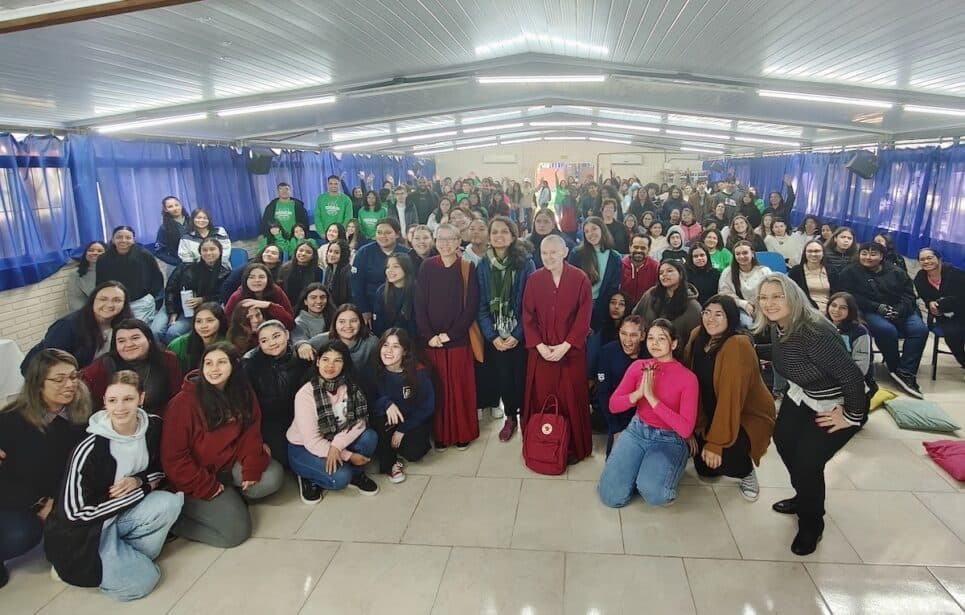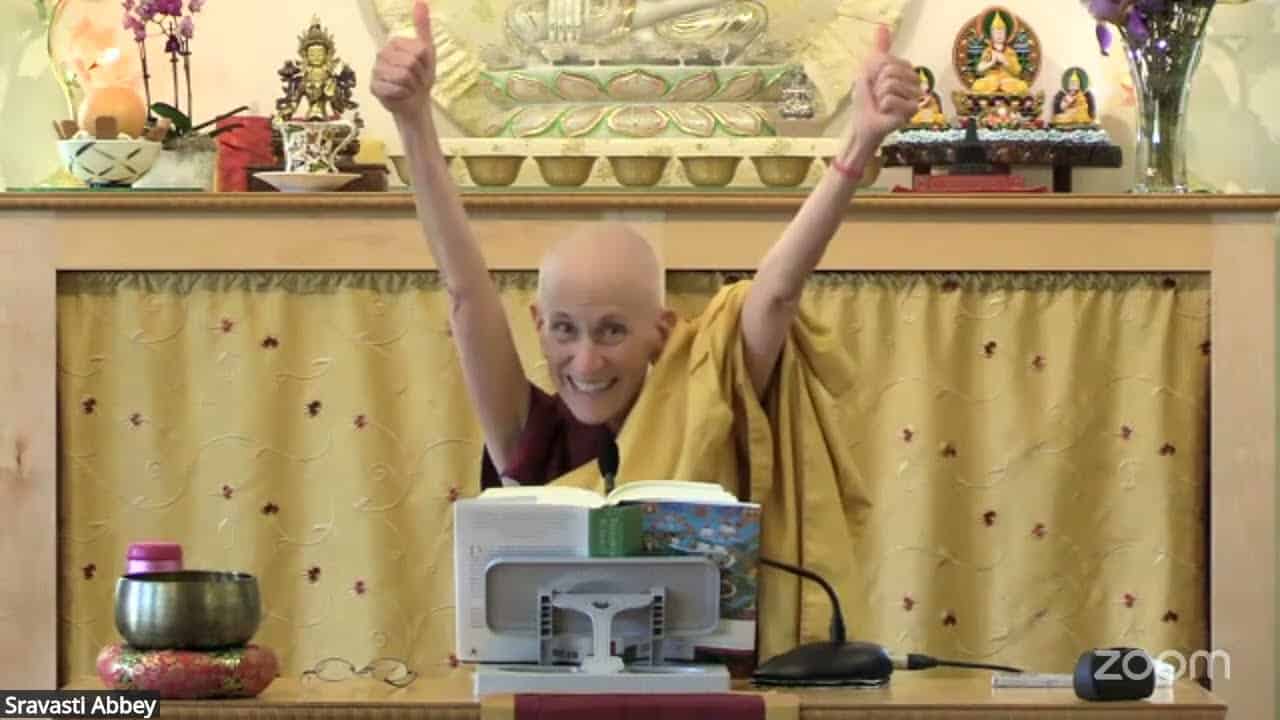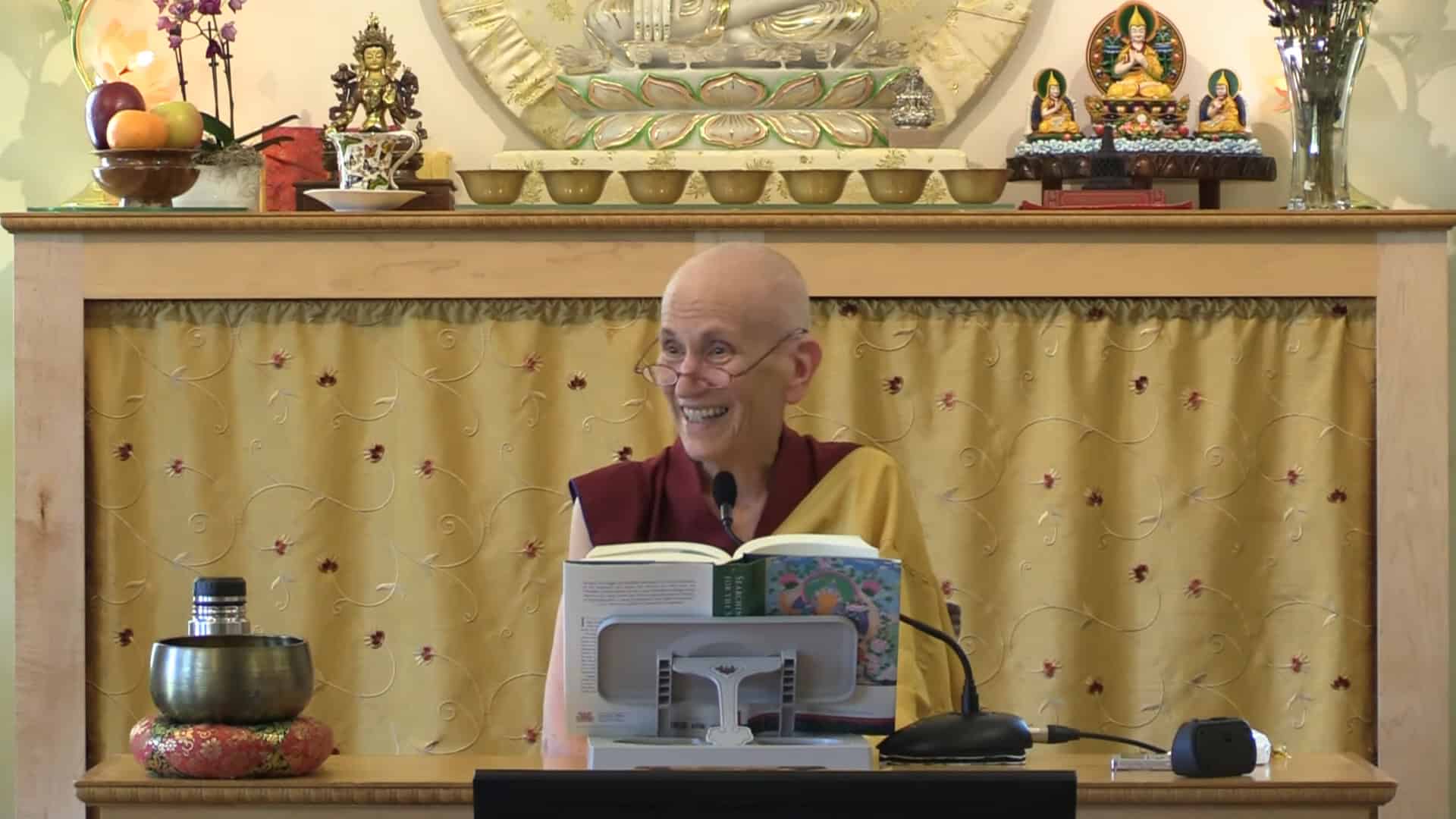Small city, big heart

Venerables Samten and Damcho share their experiences attending a conference and symposium on Education, Peace, and Compassion in Uruguaiana, Brazil. You can also watch Ven. Samten share about the trip here and Ven. Damcho discuss her experience here. You can see more photos of the trip here.
“How did you wind up traveling to Uruguiana, and what are you going to do there?”
We often encountered these questions on our almost three-day journey from Sravasti Abbey to Uruguiana, a city of about 130,000 inhabitants located in the southernmost part of Brazil bordering Argentina and Uruguay.
“Some people see Uruguaiana as where Brazil ends, but for others, it’s where Brazil begins,” said our friend Rui Machado, a professor at the Federal University of Pampa (Unipampa) and the key organizer of our trip to Brazil from April 21 to May 3, 2025.
Indeed, our connection with Brazil began a few years ago when Rui and his family, who are residents of Uruguaiana, joined the Sravasti Abbey Friends Education (SAFE) program and Retreat from Afar.
Wishing to deepen the connection between Sravasti Abbey and Unipampa where they were enrolled as graduate students, Rui and his daughter Maria Clara requested Sravasti Abbey monastics to offer online talks and lead a bi-weekly study group starting in March last year. Maria Clara offered interpretation from English into Brazilian Portuguese, especially for her mother Gláucia.
The family began to dream of inviting Sravasti Abbey monastics to teach in Uruguaiana, but had no idea how this might come to pass.
A Dream Takes Shape
In fall of 2024, Rui and Maria Clara chanced upon a call for university funding proposals from the federal government. Together with their colleagues from a research group on contemplative practices in education, and in consultation with Sravasti Abbey, they put together a proposal for Unipampa to host a two-day International Seminar on Peace Education, focusing on compassion in teacher training, followed by a two-day Symposium on Compassion and Peace Education for bachelor students and teachers.
It was the first time anyone from the university had submitted such a funding proposal, but they figured, nothing ventured, nothing gained.
To the team’s surprise and delight, their proposal was accepted. Thus began a flurry of activity to coordinate an international line-up of speakers, work out event logistics, and how to facilitate simultaneous interpretation between Brazilian Portuguese, Spanish, and English.
Inspired by His Holiness the Dalai Lama’s teachings and vision, the Machado family reached out to his private office to request a blessing for the conference and symposium as well. His Holiness the Dalai Lama sent a beautiful letter of support that you can read here.
Sadly, the dates of the conference coincided with Ven. Chodron’s teaching tour in Europe, so she pre-recorded a talk on “Compassion for Peace in Schools” that was screened at the conference with subtitles in Portuguese. You can watch the talk here. In Ven. Chodron’s place, Vens. Samten and Damcho, who were also schoolteachers before ordaining, made the long trip to attend the full event in person.
It was a journey well worth making. For most of the city’s inhabitants, it was their first time encountering Buddhist monastics, and they were eager to learn more about us.
The moment we stepped out of the hotel to take a walk, we were immediately greeted by strangers who had heard about the conference on the radio and were excited to meet us. We were also invited to offer a radio interview. See photos here. This friendly reception and curiosity continued throughout our stay, which moved us deeply.
First International Seminar on Peace Education
All events of the conference were offered for free at the 1,870-seat theatre downtown, and three local schools even stopped all classes on Thursday and Friday so that teachers could attend the two-day event in full. Two of the schools also sent high school students who were preparing to be kindergarten teachers as participants, making for a youthful and vibrant audience.
After opening remarks by university and government officials, teachers presented their experiences implementing meditation practices in the classroom. This was followed by an academic panel on peace and territories, which was especially relevant to Uruguiana’s situation as a city with three borders (Brazil, Argentina, and Uruguay).
In the afternoon, Ven. Samten presented on a panel about “Compassion promoting human values and peace in school classrooms,” drawing from the book An Open-Hearted Life and her experiences as a music and special education teacher in Canada. The first day rounded up with an academic talk and group panel on compassion and environmental pedagogies in response to the climate crisis, followed by short presentations by graduate students and teachers.
The second day of the conference began with the screening of Ven. Chodron’s talk, followed by a question and answer session with Vens. Samten and Damcho.
After an academic presentation on compassion and nonviolence in education, Ven. Damcho spoke on a panel on “Peace in education by school teachers and management” alongside local government officials. She led a short guided meditation and shared from her experiences teaching and working on education policies in Singapore.
Topping off the rich conference line-up was a two-hour talk via Zoom by Buddhist scholar Dr. Jan Willis on “How I Learned Nonviolence.” Dr. Willis shared her experiences growing up in a mining camp in Alabama and being targeted by the Ku Klux Klan, and how she and her family responded to these acts of hate by participating in the nonviolent resistance movement led by Dr. Martin Luther King.
The audience was riveted by her story of resilience and hope, which culminated in her dialogue with a teacher and leader from the Black Movement in Uruguaiana, who was present onsite. Witnessing this conversation between two black women educators and activists from different countries and generations was incredible and inspiring. The conference presentations will be posted on YouTube eventually, so definitely look out for the recording of this session. The conference website is here.
Symposium on Compassion and Peace Education
The weekend symposium for bachelor students and teachers shifted to the Unipampa campus, where Vens. Samten and Damcho offered a daylong workshop on “Working with Anger” that included short talks, guided meditation, and discussion groups. As it was a Saturday, some participants brought family members to attend the workshop as well, making for an intimate exchange with about 40 people.
The same dedicated group returned on Sunday to listen to Rui present his research on contemplative practices in the classroom, and the symposium concluded with everyone sharing their reflections on a life-changing weekend.
As one participant put it, “I came for professional development as a school teacher, but I soon realized that I was here as a human being. I needed to attend this conference for myself. I am a different person now from who I was at the start of the event.” News articles about the conference and symposium in Portuguese are here and here.
This rich weekend concluded with Diogo and Leticia, friends of the Machado family, offering us a lovely home-cooked meal at their family’s farmstead, where we had beautiful views of the plains.
A Warm Embrace from Schools and the Public
After the conference and symposium concluded, we had the chance to visit two public schools. We first went to Elisa F Valls School, where the teachers and some of the high school students had attended the conference. It was a joy to reconnect and we asked the students to share with us their dreams as we visited different classrooms, before having a group question and answer session in the school auditorium.
Next, we visited Moacyr Ramos Martins School, a K-12 school where the teachers attended the conference. Upon arrival, we were literally embraced by a swarm of little ones out for recess. We visited an art class and robotics class with students doing group work on creative projects, spoke to elementary class students about the animals at Sravasti Abbey, and fielded excellent questions from junior high students about Buddhist monastic life.
At the end, an elementary class student presented us with a sheaf of cards drawn by her classmates, expressing their welcome and joy in meeting us. See the cards here.
Three junior high students also hung around to ask us more questions about Buddhism. “Maybe we have to start a Buddhist youth group!” quipped our friend Rui.
Our final event was a public talk held at Unipampa on “Mental Health – Staying Calm in Difficult Situations.” The auditorium was filled with more than a hundred students, professors, and community members, all keen to hear about how to work with the mind when stress arises.
We were especially delighted that the manager of the hotel where we stayed, with whom we became friends, came with her sister, giving us the chance to repay her kindness.
In response to this interest, we will certainly continue our collaboration with the Unipampa, beginning with Maria Clara offering simultaneous interpretation into Brazilian Portuguese for the Abbey’s monthly Sharing the Dharma Day. Ven. Samten and Damcho will continue with a monthly online study group on “Working with Anger” as well.
New Friends Caring for Us
Throughout our stay, the Machado family graciously opened their home to us and also introduced us to their old friends Isabel and her daughter Débora from the city of Salvador in the state of Bahia. The two families had not seen each other in ten years and had a happy reunion in Uruguaiana to support the conference. Débora was an integral part of the planning team assisting the Machados with applying for funding and running of the conference. Together with Gláucia, Isabel and Débora joyfully prepared authentic vegetarian Brazilian cuisine and sent us home with many recipes!
En route to Uruguaiana, we also had to transit in the city of Porto Alegre, so we took the opportunity to visit Buddhist communities established by Nyingma master Chagdud Tulku Rinpoche and his students.
A few hours after getting off our international flight, we went to the Templo Caminho do Meio, where we were honored to offer a question and answer session alongside the temple’s Brazilian founder Lama Padma Samten, who integrated our visit seamlessly into his ongoing retreat. You can watch the session here.
On the way back to the Abbey, we traveled to Chagdud Gonpa Khadro Ling located two hours outside of Porto Alegre in Três Coroas, where Chagdud Khadro, the spiritual wife of Chagdud Tulku Rinpoche, gave us a tour of the impressive and beautiful temple that they built. We were moved by the accessibility of these teachers and the warm reception from their Dharma communities.
Due to a flight change, we found ourselves in Rio de Janeiro for an extra day before we could connect to our international flight home. Brazilian monk Ven. Kalden, who had met Vens. Chodron, Damcho, and Konchog in Bodh Gaya in 2022, came to the rescue by arranging for us to stay at the FPMT Centro Shiwa Lha. Again, we were kindly hosted by centre director Neyl Soares and resident nun Ven. Kunsang, and had the privilege of having our own carioca-monk-tour guide show us some of the sights in the Marvelous City.
Words cannot express our gratitude to all our friends in Brazil for receiving us with such kindness and generosity. At a time when universities and education in America seem to be facing great challenges, the opportunity to participate in a federally-sponsored, free conference that saw people from all sectors coming together to discuss and reflect on important human values was a healing balm for our hearts, a brilliant ray of hope breaking through the gathering clouds.
Sravasti Abbey Monastics
The monastics of Sravasti Abbey endeavor to live generously through dedicating their lives to the Buddha's teachings, practicing them earnestly, and offering them to others. They live simply, as the Buddha did, and offer a model for society at large, showing that ethical discipline contributes to a morally grounded society. Through actively developing their own qualities of loving-kindness, compassion, and wisdom, the monastics aspire to make Sravasti Abbey a beacon for peace in our conflict-torn world. Learn more about monastic life here...


